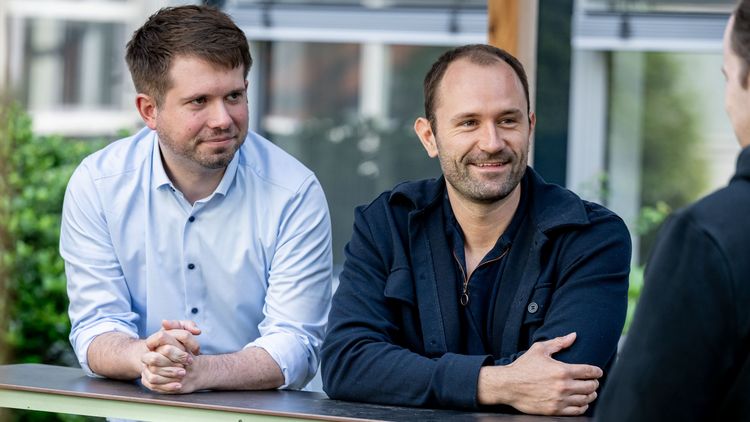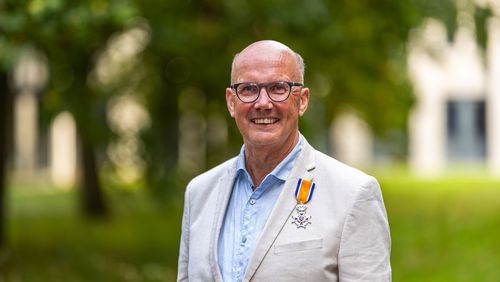The University of Oldenburg is committed to promoting good health among students and employees. In this interview, Tim Wohlann and Leon Hoffmann explain the role of the Employee and Student Health Management Services.
What is the mission of the Employee and Student Health Management Services?
Tim Wohlann: The Student Health Management Service aims to promote students' health and create a supportive environment in which they can develop their full academic potential. We aim to influence the studying conditions and the learning and teaching environment and design them to be conducive to good health.
Leon Hoffmann: Our mission in Employee Health Management is to ensure that the university offers employees healthy working conditions and supports them in maintaining a healthy lifestyle. We address both physical and mental health using systemic approaches involving structures and processes as well as strategies that focus on individual factors such as nutrition or ways to improve mobility for those with sedentary jobs.
The Employee Health Management Service was established a long time ago, whereas the Student Health Management Service wasn't launched until 2022. What prompted this move?
Wohlann: There is a growing amount of data showing that, owing to a variety of factors, the health of students in Germany is deteriorating. We wanted to actively combat this trend. The university has had facilities such as university sports and the Psychological Counselling Service (PSB) for many years, but it lacked a service that was dedicated to general student health management and could initiate measures across all areas. The university sports department came up with the idea for this project. The concept was presented to the Presidential Board in 2022 and met with approval. There is now a working group, the Student Health Management Steering Committee, which meets regularly to discuss the strategy and implementation of health-promoting measures.
Hoffmann: The fact that the University of Oldenburg has a Student Health Management Service is not a given, because unlike with the Employee Health Management Service, there is no legal basis for it. However, we and the Presidential Board are convinced that a university can only be healthy and function well if the work and study conditions are designed to benefit everyone.
Students are a vulnerable group in terms of health.
How did you determine the specific health-management requirements for students?
Wohlann: We conducted a survey among students on their health and the study conditions here at the University of Oldenburg which confirmed the findings at other universities: students are a vulnerable group in terms of health. Many of them move to a new location to study and then have to adapt to a new environment, become more independent, take care of their own finances, and so on. All this can be very stressful for young people. On top of that, they often have physical complaints similar to those of employees. Muscle tension and back pain are common as a result of the widespread lack of movement.
What does the Student Health Management Service offer to minimise these health risks?
Wohlann: We provide a variety of services. We organise get-togethers such as StudiConnect – 5 Minutes for Friends or small sports events such as Wir BeLEBEN den Campus! (We Liven Up the Campus!), where students can meet up to play frisbee or volleyball. Then there's the Studi-Running Club, where students can arrange to go running together. Students can buy fresh regional and seasonal fruit and vegetables at our annual Campus Market. The new water dispensers where water bottles can be filled for free are also a big improvement. There is now a dispenser in the Sports Centre, one on the Ring Level at Wechloy Campus and one at the Haarentor University Library, and there are plans to install more. In addition, students have teamed up with the Technical Education working group to build outdoor furniture to encourage people to hang around and relax on campus.
What are common health issues among employees?
Hoffmann: A large-scale survey recently conducted among employees showed that overall, we have a high level of job satisfaction, and that many employees are happy working here. At the same time, almost half of those included in the survey said they suffered from emotional exhaustion. This is clearly not entirely work-related; these times are challenging for everyone. We want to take further measures to support our employees here.
University employees can seek help and advice from the Employee Health Management team on all matters related to health.
What services does the university provide to promote general health?
Hoffmann: University employees can seek help and advice from the Employee Health Management team on all matters related to health. We also offer a wide range of health-related events as part of our continuing education programme. With our Counselling and Coaching Service for Employees, we have a competent team to support colleagues experiencing challenges at work. Employees dealing with conflicts at work or difficult situations in their private lives can also use this service. As part of our reintegration management programme, we help employees to settle back in at work after a long period of illness. The Family Service is popular with employees seeking advice on questions such as how to balance work and family life. The Workplace Safety Unit is another important service. It provides advice on issues such as ergonomics in the workplace and maternity protection. We also value our collaboration with employee interest groups.
At the end of April, the Employee and Student Health Management teams jointly organised the first Health Days event at the university. What was the goal here?
With the Health Days we wanted to encourage people to actively do something for their wellbeing – supported by various services such as the Psychological Counselling Service, the University Sports department, the Workplace Safety Unit and the Family Service, as well as external partners such as Caritas and BeKoS. We teamed up with these services, and with the support of the Presidential Board we put together a diverse, three-day programme encompassing both online and in-person elements. Here at the university, participants could try out yoga, Pilates or meditation, for example. There were also workshops and lectures on topics such as stress and time management, mental health in teams and ergonomic working practices. Many events were open to both students and employees since both groups tend to have similar health issues. We were always aware that a single Health Day wouldn't be very sustainable – it was more about sensitising participants to certain health issues of which they may not have been so aware.
Can you give an example?
Eye health is one example. Both students and university employees are generally spending more and more time looking at screens, which can strain the eyes. Exercises, short breaks and the right screen settings can help to minimise the risk of damage.
Were the Health Days a success?
Wohlann: We could see based on the high number of registrations that there's plenty of interest. Some courses were fully booked within minutes. In total, more than 400 people took part in Health Days events. We also got a lot of feedback, which provides us with valuable ideas for our future activities and programmes.
Interview: Henning Kulbarsch





